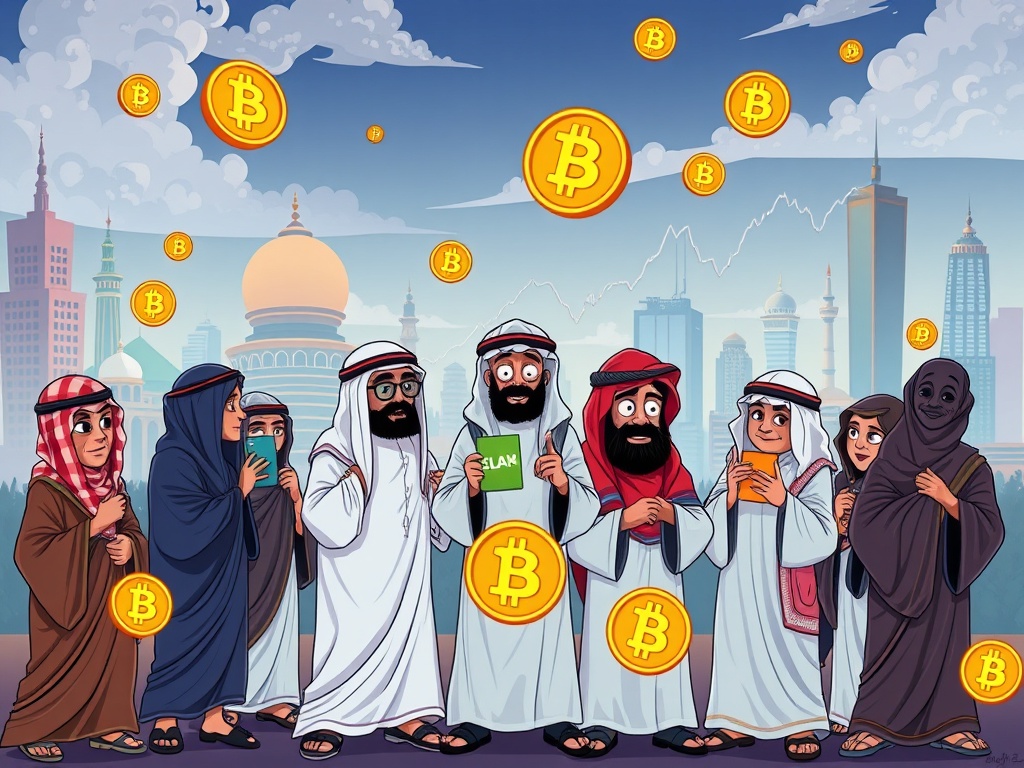Unveiling the Hidden Truth: Middle Eastern Bitcoin Holdings Far Exceed Public Reports
0
0

BitcoinWorld

Unveiling the Hidden Truth: Middle Eastern Bitcoin Holdings Far Exceed Public Reports
The world of cryptocurrency is constantly evolving, often with intriguing whispers and groundbreaking revelations. Recently, Eric Peters, the Chief Investment Officer of Coinbase Asset Management, shared a significant insight on the Bankless podcast. He expressed strong confidence that Middle Eastern Bitcoin holdings are far more substantial than what is publicly reported. This isn’t just a casual observation; it points to a fascinating and discreet dynamic in global finance.
Unveiling the Strategy Behind Middle Eastern Bitcoin Accumulation
Peters’ statement suggests a calculated and quiet accumulation of digital assets by powerful entities, including sovereign wealth funds, across the Middle East. This strategic discretion could stem from several factors. For instance, geopolitical considerations, evolving regulatory frameworks, or simply a desire to maintain a competitive advantage in a rapidly transforming financial landscape may play a role. The implications of such hidden reserves are profound, hinting at a significant, yet unacknowledged, influence on the global crypto market.
While precise figures remain elusive, the confidence from a prominent figure like Peters, associated with a major crypto exchange like Coinbase, lends considerable weight to this perspective. It indicates a deeper understanding of market movements and private institutional activities that are not always visible to the public. This quiet accumulation of Middle Eastern Bitcoin could indeed reshape future market narratives and influence global economic strategies.
How Are Institutions Entering the Bitcoin Market?
Peters also highlighted a critical trend: while traditional institutions are increasingly looking at the Bitcoin market, many remain hesitant to commit large sums directly at current price levels. This caution often leads them to explore alternative avenues for exposure to the broader crypto space. Rather than making immediate, direct Bitcoin investments, these institutions frequently prefer traditional stocks, or, more specifically, strategic investments in crypto-related infrastructure.
What exactly does “crypto-related infrastructure” encompass? It involves a broad spectrum of foundational ventures that support the digital asset ecosystem:
- Blockchain Technology Companies: Firms dedicated to developing and enhancing the underlying blockchain technology.
- Mining Operations: Businesses involved in the crucial process of validating transactions and creating new Bitcoin.
- Custodial Services: Providers specializing in the secure storage and management of digital assets for institutional clients.
- Exchange Platforms: Investments in the companies that build and operate the platforms facilitating cryptocurrency trading.
This phased and indirect approach allows institutions to gain valuable exposure and a deeper understanding of the ecosystem. It minimizes direct exposure to Bitcoin’s inherent volatility. Essentially, it is a strategic move to build foundational support for the industry, potentially paving the way for future direct investments in assets like Middle Eastern Bitcoin as confidence grows.
The Impact of Middle Eastern Bitcoin on Global Finance
The confidence expressed by Eric Peters regarding the substantial Middle Eastern Bitcoin holdings signals a potential, yet quiet, shift in global financial power. As these nations continue their efforts to diversify economies away from traditional oil revenues, digital assets like Bitcoin offer an attractive alternative for long-term wealth preservation and strategic growth. Their discreet accumulation points towards a well-considered, long-term strategic vision.
Consider the potential ramifications of this trend:
- Market Stability: The presence of large, stable institutional holders can provide a crucial floor for Bitcoin’s price during market downturns, contributing to overall stability.
- Enhanced Legitimacy: Increased involvement from sovereign and institutional entities lends greater credibility to Bitcoin as a legitimate and viable asset class on the global stage.
- Innovation Hubs: The Middle East could emerge as a significant hub for blockchain innovation and development, fueled by these strategic digital asset investments.
This evolving landscape underscores Bitcoin’s growing role as a potential global reserve asset and a powerful tool for national economic diversification. The quiet confidence in these substantial holdings speaks volumes about the future trajectory of digital finance and its increasing integration into traditional economic frameworks.
Conclusion:
Eric Peters’ insights offer a compelling glimpse into the sophisticated world of institutional crypto adoption. The notion of substantial, yet unreported, Middle Eastern Bitcoin holdings paints a picture of strategic foresight and a calculated approach to digital asset integration. While some institutions are treading carefully, prioritizing infrastructure investments, the underlying trend is undeniably clear: Bitcoin is increasingly becoming a cornerstone of global financial strategies. This is happening even if some aspects of its adoption remain behind closed doors. This quiet revolution is poised to shape the future of finance in profound and lasting ways.
Frequently Asked Questions (FAQs)
Q1: What is the main claim made by Coinbase CIO Eric Peters?
A1: Eric Peters claims that Middle Eastern countries hold significantly more Bitcoin than what has been publicly reported, suggesting a discreet and substantial accumulation of the digital asset.
Q2: Why might Middle Eastern countries keep their Bitcoin holdings discreet?
A2: Reasons could include geopolitical considerations, a desire to maintain a competitive advantage, or navigating evolving regulatory environments without public scrutiny.
Q3: How are institutions investing in crypto if not directly in Bitcoin?
A3: Many institutions prefer to invest in crypto-related infrastructure, such as blockchain technology companies, mining operations, custodial services, or exchange platforms, before making direct investments in volatile assets like Bitcoin.
Q4: What is “crypto-related infrastructure”?
A4: This term refers to the foundational technologies and services that support the cryptocurrency ecosystem, including blockchain development, crypto mining, secure digital asset custody, and trading platforms.
Q5: What could be the impact of significant Middle Eastern Bitcoin holdings?
A5: Such holdings could lead to increased market stability, enhance Bitcoin’s legitimacy as an asset class, and potentially position the Middle East as a key hub for blockchain innovation and development.
If you found this exploration into Middle Eastern Bitcoin fascinating, share this article with your network! Help us spread the word about these intriguing insights into global crypto adoption and institutional strategies.
To learn more about the latest Bitcoin market trends, explore our article on key developments shaping Bitcoin institutional adoption.
This post Unveiling the Hidden Truth: Middle Eastern Bitcoin Holdings Far Exceed Public Reports first appeared on BitcoinWorld and is written by Editorial Team
0
0
 Manage all your crypto, NFT and DeFi from one place
Manage all your crypto, NFT and DeFi from one placeSecurely connect the portfolio you’re using to start.





